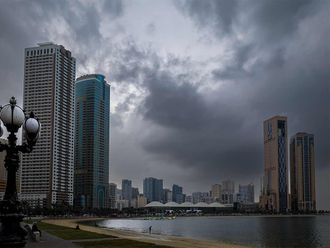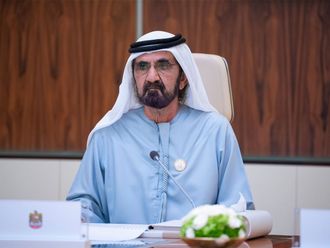Abu Dhabi: Shahid Malik, former UK Minister of Justice in the UK, called UAE a land of “cultural miracles”, pointing out that the peace that exists among diverse groups in the country is remarkable.
Malik was addressing the Forum for Promoting Peace in Muslim Societies held in Abu Dhabi yesterday.
The former UK minister discussed the importance of hope in tumultuous times. He explained that it is crucial to understand the role of Islam for human rights and as an antidote to extremism in the name of religion. “You cannot beat an ideology with a bomb. This is a battle for hearts and minds. Non-Muslims in other parts of world perceiving Islam in a negative light is a reality, but we must reach out to them. This is why we need Shaikh Abdullah Bin Bayyah [president of the forum for promoting peace among Muslim societies] and others to represent Muslims, not the Islam hijacked by twisted and perverted individuals. We need someone brave to speak out against the extremists. Edmund Burke said, ‘All that is necessary for evil to prevail is for good people to do nothing.’ We are slowly rising to the challenge, perhaps the most profound challenge of our time,” said Malik.
Shaikh Hamza Yousuf, world-renowned scholar and president of Zaytuna College in USA, spoke on topics ranging from history to philosophy to theology. In discussing the role of the state, Yousuf compared Hobbe’s Leviathan and Imam Maqdisi’s three primary roles of the state, which are corruption, unreasonable costs of living and a wider division between the rich and poor. He then applied these points to explain Syria’s current turmoil.
Shaikh Yousuf also reviewed the necessary roles a state needs to play by comparing the works of well-known scholars such as Ibn Khaldoun and John Locke.
He emphasised how all these functions are futile when they are not ontologically anchored by the concept of justice.
Yousuf focused on the spiritual crisis most people face, which grounds the sociopolitical crisis we are observing in the modern world. “It is only by confronting spiritual diseases that we can overcome our contemporary problems,” he concluded.
Shaikha Lubna Al Qasimi, UAE Minister of State for Tolerance and President of Zayed University, discussed various preventive measures that the UAE has taken to counter terrorism within the country and on foreign soil.
The UAE is a cradle of peace and a global role model of cross-culturalism and social harmony, home to more than 200 nationalities, said Shaikha Lubna.
Shaikha Lubna said the UAE government is constantly promoting harmony and peace, and a cosmopolitan diverse society, to gain strength and show to the world the best mixture of ethnicities, religions and cultures at a time when many divisive issues threaten global peace and plague the modern world. She added that the UAE is eager to build peaceful inter-religious dialogue.
Pointing out the UAE’s lead role in promoting religious and cultural tolerance, she said the UAE government approved the National Tolerance Programme, to spread tolerance as the basis for building societies and to promote respect for cultural diversity and peaceful coexistence, rejecting violence, extremism and racism.
“Religious tolerance is a fundamental pillar of a strong state, and a catalyst of prosperity in today’s world. The UAE constitution promotes equality of rights and non-discrimination between individuals, firmly ensuring the freedom of all to practise their religious beliefs and enjoy their freedom and rights, in conformity with international conventions and treaties,” Shaikha Lubna said.
“The UAE was recently ranked third globally in the National Culture Index for its mix of openness, generosity and tolerance, according to the Annual Report of Global Competitiveness, issued by the Institute for Global Development in Switzerland,” she added.
Dr Mohammad Mattar Al Kaabi, secretary-general of the forum, highlighted national efforts to promote tolerance in words and in action. He discussed the need to communicate and reach out to all cultures facing extremism, demonstrating initiatives and strategies that the Islamic authority have in place to achieve this aim.
Dr Al Ka’abi said, “We work tirelessly to promote religious awareness, implementing tolerance, moderation and peace within society. We will not allow extremists to promote their distorted views among us.”
He also spoke about the anti-discrimination act issued by the country in 2015, which guarantees the freedom of individuals from religious intolerance and underpins the UAE’s policy of inclusiveness. The act protects human dignity and religious freedom while providing peace to all cultures. “There are 5,469 mosques in the UAE where the government works to promote a civilised image to become the educational platform where everyone benefits from these initiatives,” said Dr Al Kaabi.
Cardinal Theodore Edgar McCarrick, Archbishop Emeritus of Washington; Jan Figel, Special Envoy for the promotion of freedom of religion or belief outside of the EU; Prof Dr Hisha A. Hellyer, Senior Fellow, Atlantic Council and RUSI; and Dr Abdul Hakim Jackson, King Faisal Chair in Islamic Thought and Culture and Professor of Religion and American Studies and Ethnicity, provided testimonials and recommendations on the importance of the Marrakesh Declaration. The declaration from last year provides a legal framework and a call to action to preserve the rights of religious minorities in predominately Muslim majority communities.
More than 400 intellectuals, scholars, thinkers, researchers, youths and opinion-makers participated in the two-day forum at the Jumeirah Hotel at Etihad Towers in Abu Dhabi.











